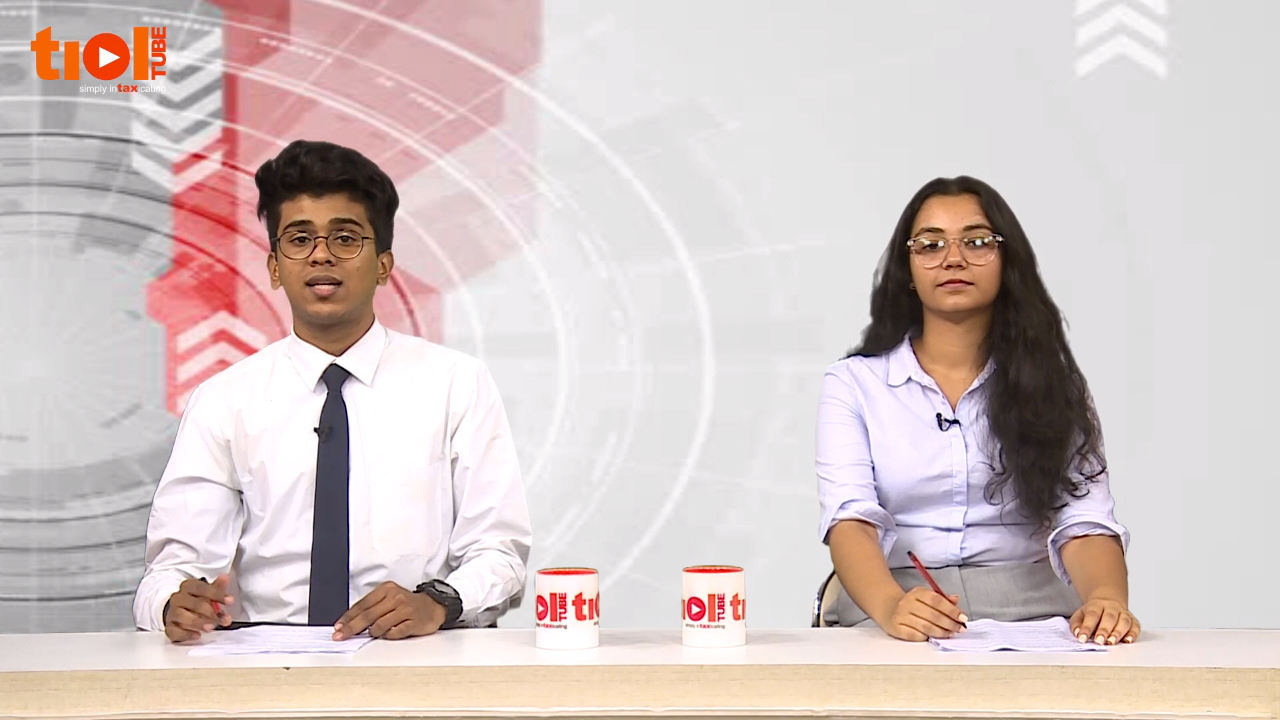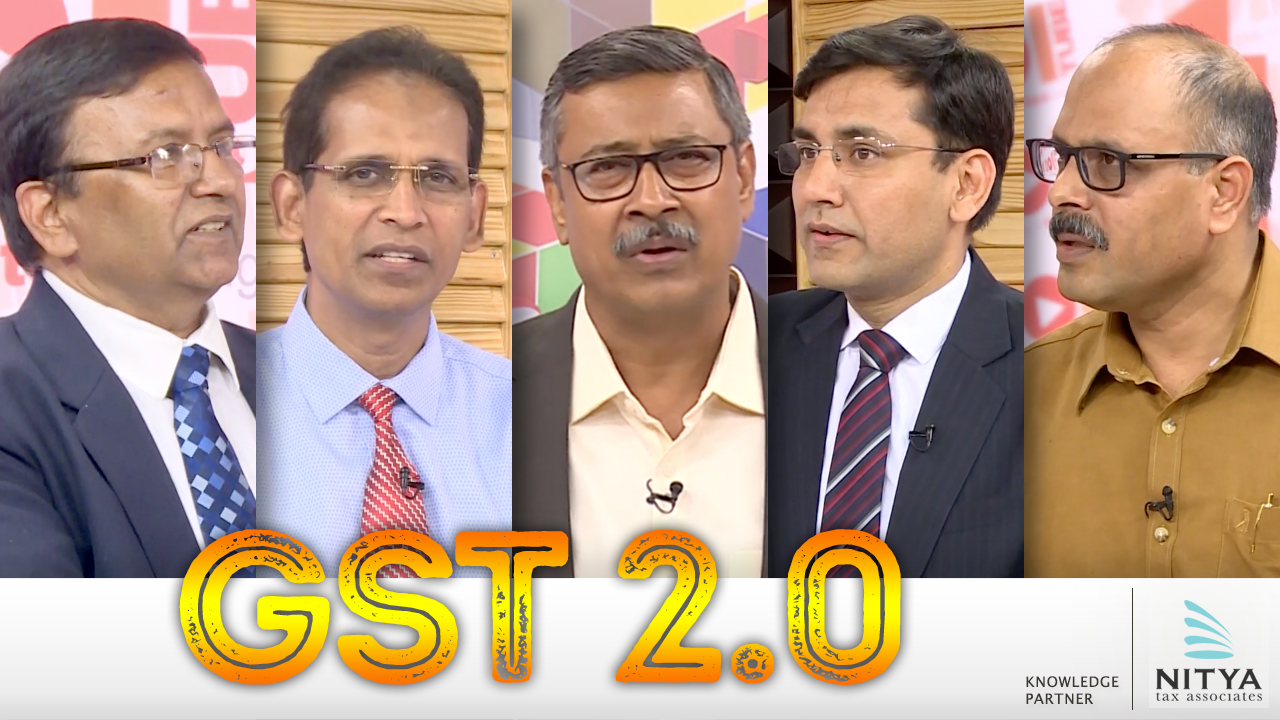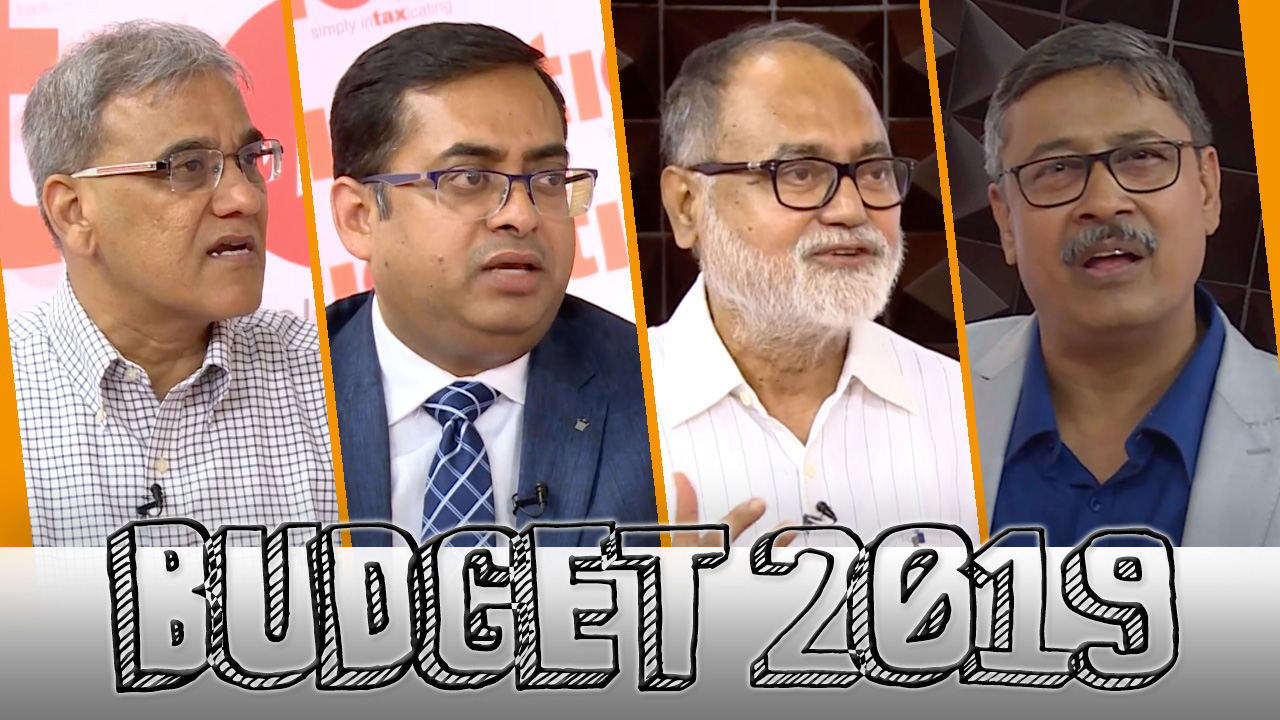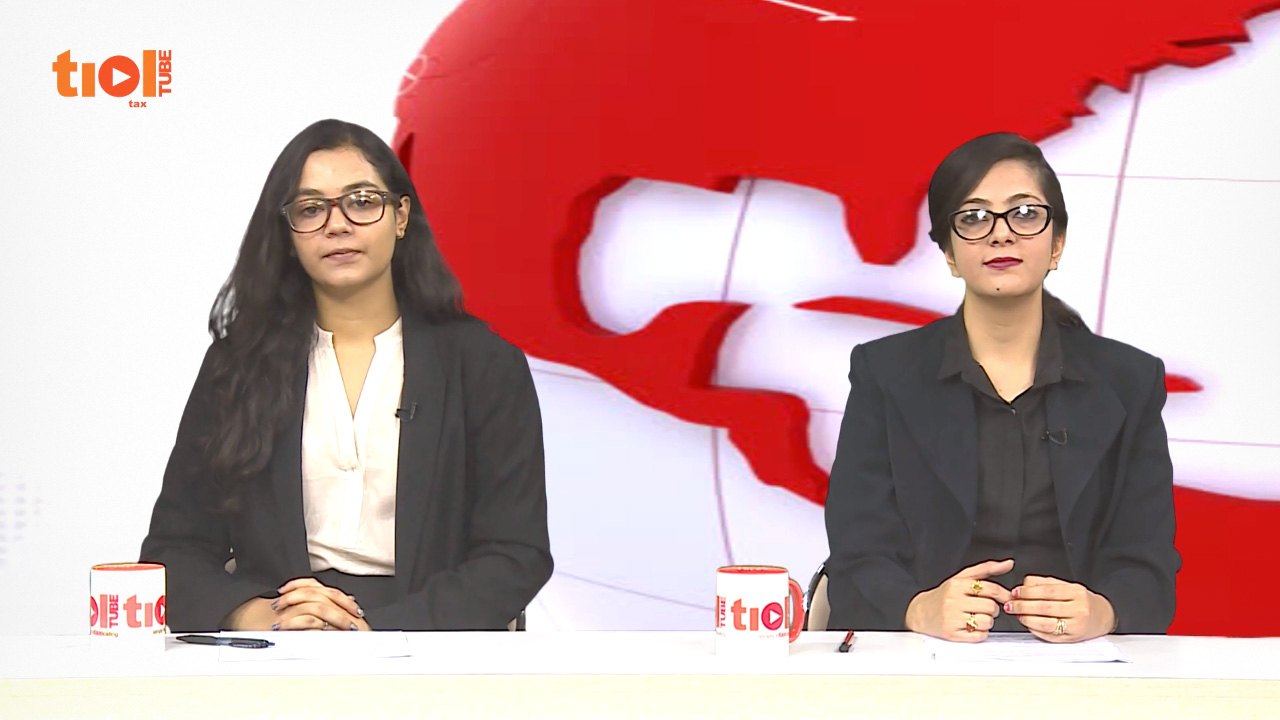|
SERVICE TAX
2019-TIOL-228-SC-ST
CST Vs Indus Towers Ltd
ST - In this case, the Delhi High Court held that Cenvat credit is admissible on Towers, shelter and accessories used for providing telecom services – The decision of the CESTAT Larger Bench in M/s Tower Vision India Pvt Ltd. 2016-TIOL-539-CESTAT-DEL-LB was reversed.
Held - Delay condoned - Notice issued - Matter tagged with C.A. No. 10409-10410/2014: SC
- Notice issued: SUPREME COURT OF INDIA
2019-TIOL-227-SC-ST
CC, CE & ST Vs Sreevatsa Real Estate Pvt Ltd
ST - The assessee company is registered for providing Construction of Residential Complex Service - It was paying service tax under this head but later stopped doing so, having treated such service as 'Works Contract service' & resumed payment of service tax under this head after availing benefit of reduced liability under the Works Contract (compensation scheme for payment of service tax) Rules, 2007 - The Revenue opined that the assessee was required to pay service tax under both CICS as well as WCS - The Revenue also sought to deny Cenvat credit on grounds that it had been based on measurement book instead of invoices issued by the contractor - Credit availed for some other time periods were disallowed on grounds that the invoices did not bear the requisite details such as invoice number or date - Hence duty demands were raised with interest for recovery of credit along with penalties being imposed - Later, the Tribunal held that no tax was leviable for period upto 01.06.2007, as per the Apex Court's decision in CCE & Cus, Kerala Vs L&T Ltd. - Besides, the Board Circular dated 10.02.2012 reiterated its earlier Circular dated 29.01.2009 & clarified that for the period 01.07.2010, such services provided by the builders & developers were not taxable - Hence it was held that no tax could be raised for period before 01.07.2010 - For the period after this date, the benefit of composition scheme has been denied on sole grounds that the assessee did not exercise such option before due date of payment of tax - Regarding, denial of credit on grounds on invoices not bearing names & numbers, it was held that such discrepancies were curable in nature & could not be made grounds for denial of credit - Hence the O-i-O was quashed.
Held - Notice issued in respect of Revenue's appeal as well as application for condonation of delay: SC
- Notice issued: SUPREME COURT OF INDIA
2019-TIOL-226-SC-ST-LB
CCT Vs State Bank Of Hyderabad
ST - The assessee is a public bank having its headquarters at Hyderabad - It carries out various transactions on behalf of the Central & State Governments - It also receives commission from the RBI for services rendered, classifiable as 'Agency Services' - During the period of dispute, the assessee paid service tax under protest, on such services provided - Further demands were raised to appropriate the amount already paid and also impose demand for interest & penalties u/s 76 & 77 of the Finance Act 1994 - Later, the Tribunal held that Notfn No 22/2006-ST exempted taxable services provided or to be provided by an person to the RBI when service tax is liable to be paid u/s 68(2) of the Finance Act 1994 r/w Rule 2 of the Service Tax Rules 1994 - It also exempts taxable services provided or to be provided to any person by the RBI - Hence the demands raised were quashed.
Held - Delay condoned - Notice be issued to the parties: SC
- Notice issued: SUPREME COURT OF INDIA
2019-TIOL-1393-HC-MUM-ST
Time Packaging Ltd Vs UoI
ST - Petitioner challenges the manner in which their application under KVSS, 1998 was rejected - Petitioners' contention is that the wording in section 90(2) of the FA, 1998 viz. payment to be made within 30 days from the date of the passing of the order passed by the designated authority, should be read as within 30 days from the date of the receipt of the order passed by the designated authority - while admitting the petition on 26.08.2003, interim relief was granted to the petitioners restraining the respondents from recovering any amounts due by it under the Central Excise Act, 1944 in respect of which the petitioners had made an application under the said Scheme.
Held: Aforesaid provision came up for consideration before the Gujarat High Court in the case of Shreeji Shroff Vs. Commissioner of Income Tax - 2008-TIOL-526-HC-AHM-IT in the context of section 90(2) of the said Samadhan Scheme itself, on facts identical to the present case and the Gujarat High Court held that the provision which requires a particular action to be taken within a specified period of time from the date of the decision or order has to be necessarily be read as the date of the receipt of the order - in any event, in the present facts, section 90(2) of the Finance Act, 1998 was amended on 12/05/2000 by the Finance Act, 2000 with retrospective effect from 01/09/1998 - The amendment was to substitute the words "within 30 days from passing of an order" with the words "within 30 days from the receipt of the order passed by the designated authority" - in view of the above retrospective amendment, the petitioners challenge to the constitutional validity of section 90(2) of the Finance Act, 1998 does not survive - Nonetheless, in view of the above amendment, the period of 30 days has to be computed not from the date of the passing of the order by the designated authority on 15/02/1999, but the period of 30 days has to be computed from the date of the receipt of the order/certificate dtd.15/02/1999 - the undisputed position is order/certificate dtd.15/02/1999 was received by the petitioners on 19/02/1999 and the 30 days period under section 90(2) of the Finance Act, 1998 would run from 19/02/1999 onwards - The petitioners having deposited the amount on 23/03/1999, the same is well within the 30 days period considering the fact that February has only 28 days - respondent no. 2 designated authority is directed to issue a final certificate under section 90(2) read with section 91 of the Samadhan Scheme - recovery notices dtd.12/06/2003, 17/06/2003 and 27/06/2003 issued by the respondent No. 3, the Deputy Commissioner of Central Excise which has been stayed by interim order, are quashed and set aside - Petition is allowed: High Court [para 6 to 10]
- Petition allowed
: BOMBAY
HIGH COURT
2019-TIOL-1879-CESTAT-AHM
Indian Institute Of Management Vs CST
ST - The assessee is a society engaged in providing Management Consultancy Service, Commercial Training & Coaching, Manpower Recruitment Service, Health Club & fitness service, Renting of Immovable Property service & Accomodation Services - During the relevant period, the assessee was served two SCNs alleging that the long duration courses offered by it were not approved by the AICTE - Hence duty demands were raised in respect of such courses - One of the SCNs was issued by invoking extended limitation while the other was sent under normal limitation.
Held: The law does not provide for recognition by AICTE as a pre-condition of exemption from tax - Prior to 01.05.2011, institutes providing training leading to qualification 'recognized by law' were outside the purview of tax - Post 01.05.2011 'coaching and training' leading to qualifications 'recognized by law' are exempted (upto 01.07.2012) and in the same fall under negative list - Thus the SCN is unsustainable as there is no allegation that the coaching or training provided by the assessee is not recognize by law - This is because non recognition by AICTE is not the same as non recognition by law - As follows from Circular No. 107/01/2009-ST dated 28.01.2009, the phrase 'recognised by law' has to be given a wide meaning & cannot be read as 'granted by law' - In the present case, it is clearly established that the long term courses are recognised by the ministry for purposes of higher education & employment - Such recognition qualifies them as qualifications recognised by law - The courses under dispute have been recognized by Government as equivalent to other degree/diploma courses for the purposes of employment and higher education - Besides, the Ministry of HRD clearly laid down in its letter dated 31.01.2017 that recognition by AICTE or NBA accreditation is not required by IIMs - This is affirmed by the letter of TRU dated 14.02.2017 - Hence, long term course of IIM are courses recognized by law, in view of which the demand does not survive on merits: CESTAT
Held: Limitation - During the relevant period, it is observed that even the Revenue was unsure of the nature of service intended to be taxed - This is seen from the various circulars issued by revenue and subsequently by retrospective amendment to the definition of commercial training or coaching centres - The assessee is also a premier institution & is registered with service tax Department & its accounts are audited annually - Hence is no suppression or mis-declaration by the assessee - Hence the demand is barred by limitation: CESTAT
- Assessee's appeal allowed: AHMEDABAD CESTAT
2019-TIOL-1878-CESTAT-MAD
Total Oil India Pvt Ltd Vs CCE
ST - The issue concerns service tax liability in respect of lease rentals charged and collected by assessee on monthly basis for supply and installation of storage tanks called as "bullets" in the premises of buyer to store LPGs supplied - The very issue has been addressed by Tribunal in respect of assessee's own case in Final Order dated 23.05.2018, it has been held in favour of assessee - No new grounds or reasons found to deviate from the ratio of earlier decision - This being so, the impugned order is set aside: CESTAT
- Appeal allowed: CHENNAI CESTAT
CENTRAL EXCISE
2019-TIOL-1881-CESTAT-CHD
Domino Printech India Pvt Ltd Vs CCE
CX - The assessee is engaged in activity of manufacturing, trading of coding and marking equipment involving different types of technologies, inks and consumables, trading in spares and providing after sale service - They have also undertaken the activity of ink refilling, relabeling and manufacturing facility in Manesar, Gurgaon where inks related to the coding and marking equipment manufactured and traded by it are sold - Whether this activity amounts to manufacture - The Commissioner has observed that the containers are special type of containers and they are made such that they can be used machinery parts - The assessee has procured the empty containers and does not manufacture such containers - They are only and simply filled the empty containers with ink and no other activity undertaken as a result of process of refilling no new article comes into existence - Prior to undertaking such activity the product remained ink and even after undergoing the refilling activity remains ink - Neither these containers nor the ink manufactured by assessee, therefore, by merely undertaking the process of filling of ink/labelling of the containers which would enable the container to be used for printing - The character, name and use of the printing ink does not change - Therefore, the process of refilling and relabeling which enables the products to be used with printing ink does not amount to manufacture - No classification was proposed in SCN - However, the Commissioner have travelled beyond the allegation in SCN and classified the impugned products under sub heading 8443 99 51/52 of Central Excise Tariff without assigning any reason/evidence - The impugned order classifying the goods under 8443 99 60 is beyond the scope of SCN - The Commissioner has held that the item in question are parts or accessories of printer but there is no relationship with printers but merely the container in which ink is contained carrying out printing functions - The printer does not have any interface with impugned items as the container is unscrewed and the manifold assembly is placed on top of the container from where the pump draws ink to be supplied to the print head assembly - At the time of import of already filled containers, classification declared by assessee was accepted by department, therefore at this stage the same cannot be allowed to be classified the product under different sub heading - The assessee is regularly filing their excise returns and specifically mentioned the activity of relabeling or packing does not amount to manufacture - The activity undertaken by assessee was in the knowledge of department - Therefore, the extended period of limitation is not invokable - As duty confirmed against assessee is not sustainable, therefore, the question of imposing penalty does not arise: CESTAT
- Appeals allowed: CHANDIGARH CESTAT
2019-TIOL-1880-CESTAT-ALL
Essel Foundries Pvt Ltd Vs CCE
CX - Assessee is a manufacturer of electrical apparatus for switching or protecting electrical circuits - A fire took place in the office of CA, in the said fire some of records of assessee including some purchase vouchers in support of input tax credit of Excise duty also got partially burnt and destroyed - It appeared to Revenue that assessee have lost the documents for a total amount of Rs.3,68,265/- in the said fire in office of Chartered Accountant - It further appeared to Revenue that the claim of assessee is not proper as no fire report submitted by them from the Fire Department after investigation - The assessee have maintained proper records and they had received duty paying documents which stands confirmed from proper records available and details mentioned in Cenvat Register and further proved by production of partially damaged documents before the Original Adjudicating Authority, prove their bona fides - Further, there is no adverse material on record for disallowing the Cenvat in part - The SCN is presumptive and hence not maintainable - Accordingly, the impugned order partially disallowing Cenvat credit is set aside - It is further held that the assessee is entitled to entire Cenvat credit of Rs.3,68,275/-: CESTAT
- Appeal partly allowed: ALLAHABAD CESTAT
CUSTOMS
2019-TIOL-1877-CESTAT-MUM
Nitin Bearing Company Vs CC
Cus - The appellants imported FAG Ball Bearings & bills of entry had been filed - On adjudication, it was held that the goods had been undervalued - Demand for differential amount of duty was raised, at a figure considerably higher than the original value - The goods were confiscated & penalties were imposed - Such findings were sustained by the Commr.(A) - Hence the present appeals.
Held: The Commr.(A) omitted to examine the appellants' contentions against the O-i-O - In the O-i-O, the while invoking the privilege, and prerogative, of rejection of the declared value by invoking rule 10A of the Customs Valuation (Determination of Value of Imported Goods) Rules, 1988, the re-determination has taken recourse to Rule 8 of the said Rules on the ground that data pertaining to import of identical goods and similar goods under Rule 5 and 6 of the said Rules was not available - The rejection of declared value cannot be a cause of cavil as the declared value of the imported goods were not in consonance with the price list for the goods - The applicability & validity of the price list for determining the value u/s 14 of Customs Act, 1962 is questionable for not being consistent with section 14 of Customs Act & Rule 4 of the Customs Valuation (Determination of Value of Imported Goods) Rules, 1988 - The proper officer is required to take recourse to the rules sequentially - Assessment of imported goods require that each of the Rules pertaining to identical or similar goods be rejected with cogent reason before resorting to invocation of Rule 8 - Without such sequential application, the O-i-O & O-i-A are incorrect: CESTAT
- Assessees' appeals allowed: MUMBAI CESTAT |









